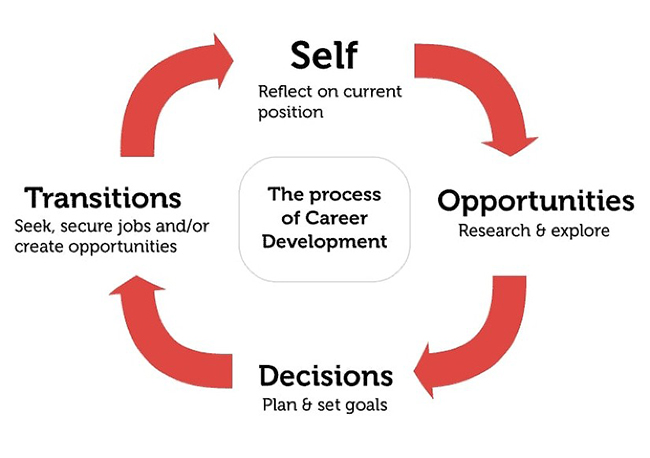Career tools

As a young researcher at the University of Copenhagen, you can improve with your skills by participating in a range of events, workshops, seminars and courses.
As an employee you have access to the extensive UCPH Course Catalogue, and departments and faculties also offer many relevant events.
As a PhD and postdoc at University of Copenhagen you may attend an early introduction workshop to strategic career planning.
The DOTS model is a four stage model of career planning originally developed by Bill Law and Tony Watts of the National Institute for Careers Education and Counselling.

Before making a career decision, you should:
- Raise your self-awareness, i.e. know your abilities, interests, values and motivations, plus whatever other aspects of "self" seems relevant.
- Then look for information about what opportunities are available to you. You can now relate what you discover about yourself to what you find out about opportunities, and a short list of possible options should emerge.
- Having to decide between these opportunities requires decision learning.
- Based on this decision, you need to use the right tactics to get the job, i.e, understanding the importance of "self-marketing" through CVs, applications, how to present a positive image at interviews.
The more logical order is therefore SODT which can be considered in the equivalent four stages:
Self - Self-assessment is a vital and often overlooked step in planning your various career paths. In order to evaluate the suitability of certain specialty options, it is important to know who you are as a person. This involves a careful consideration of your current values, interests, skills and personal qualities.
Opportunities - The next part of the process involves exploring different careers. This involves researching these in detail and the opportunities in these areas.
Career Exploration and Decision Making - Decisions have to be made which may involve narrowing down your options. You might need to gain some relevant work experience or work shadowing or gain some experience via voluntary activities. Information in careers literature either via books or websites may help as well as maybe undertaking ‘informational interviews’ with people already working in that career area. Attending events such as careers fairs can also help you to make a decision. Self-awareness, occupational awareness and intuition can all play a part in your decision-making.
Transition - You will need to decide how to reach your goals, for example, you will need to understand how the recruitment procedure works for the career you are interested in so that you can effectively promote yourself through applications, in interviews and at assessment centres.
Vitae is a non-profit program that works to improve the skills and careers of researchers all over the world.
Vitae has developed a framework to identify knowledge, behavior and competencies associated with successful researchers. The purpose of the frame is to maximize the individual's potential and career.
The Marie Curie programme has developed a tool that will help you break down your goals and objectives into concrete next steps.
